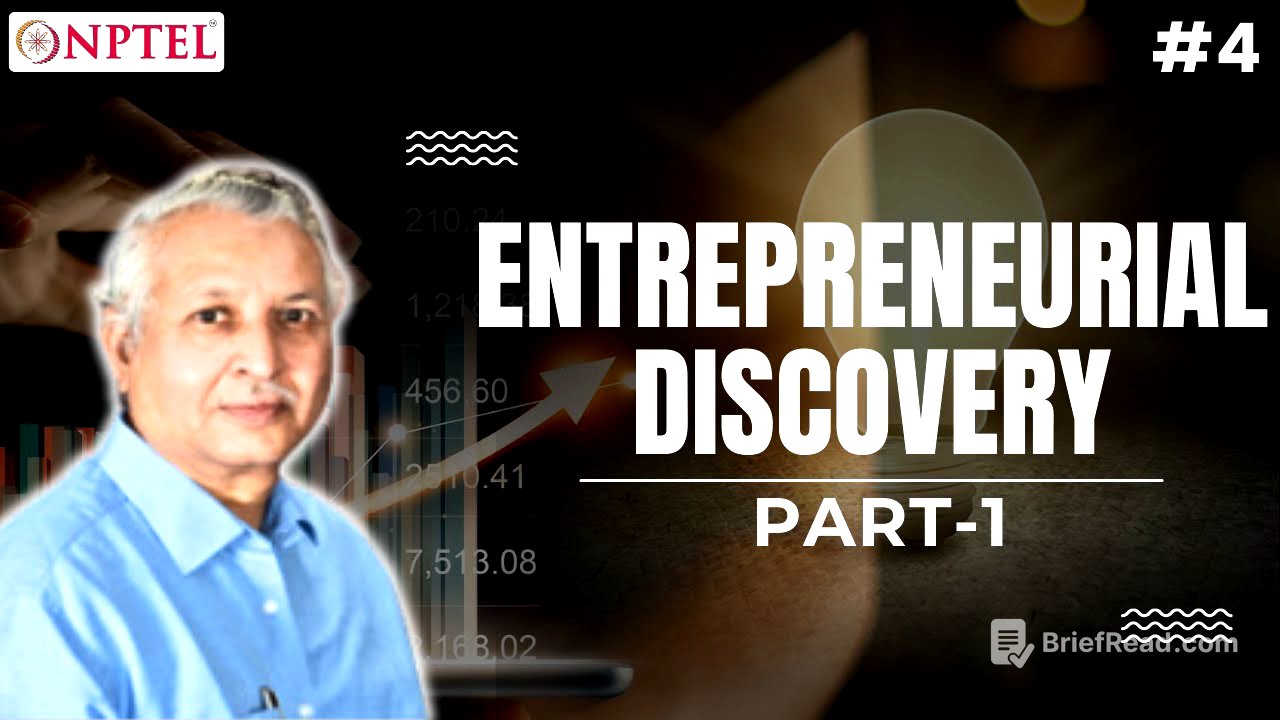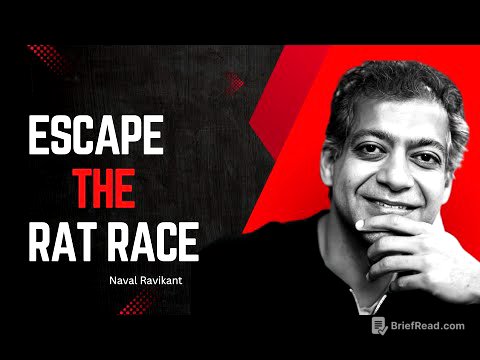TLDR;
This session on entrepreneurial discovery discusses key entrepreneurial characteristics, the excitement and challenges of working with entrepreneurs, and tools for self-discovery. It revisits the entrepreneurial journey, emphasizing talent, resourcing, and product development. The lecture highlights the importance of vision, strategy, and execution, and explores triggers for the entrepreneurial quest, such as confidence, the desire for independence, ambition, and nationalistic fervor. It also presents case studies of successful entrepreneurs like Dr. Arokiasamy Velumani (Thyrocare), Dr. Patel (Nirma), and the founder of Kent, illustrating the significance of core competencies, identifying market gaps, and meeting native needs. The lecture addresses the paradox of education and entrepreneurship, noting that while education helps, college dropouts have also achieved success. Finally, it poses three critical questions for potential entrepreneurs: "Am I creative?", "Am I passionate?", and "Do I fulfill a larger purpose?"
- Key entrepreneurial characteristics and triggers
- Case studies of Thyrocare, Nirma, and Kent
- The role of education and passion in entrepreneurship
Objectives and Introduction [0:16]
The session will focus on entrepreneurial discovery, covering key entrepreneurial characteristics, the excitement and challenges of working with entrepreneurs, and tools for entrepreneurial self-discovery. It will also touch upon personal assessments, the importance of entrepreneurship to the national economy, paradoxes in entrepreneurship, and approaches to sustain entrepreneurial momentum.
Recap of Entrepreneurial Journey [1:37]
The lecture revisits the entrepreneurial journey, highlighting the initial stages at both the corporate and product levels. At the corporate level, it involves planning, organizing, resourcing, and executing. At the product level, it includes ideation, prototype development, testing, validation, and commercialization. Critical parameters in this journey are talent organization, resourcing for growth, and product development. The lecture also discusses how entrepreneurial firms make their mark through market segmentation, capturing emerging markets, and creating new markets using technology, including digitizing existing processes and transforming basic industries.
Triggers for Entrepreneurial Quest [4:28]
People have different objectives in life, independent of their education. The entrepreneurial quest is triggered by various factors, including confidence in technical and managerial competencies paired with a clear market need. Other triggers include a dislike for the 9-to-5 job system coupled with a desire to chart one's own destiny, ambition for wealth creation, a desire to create a legacy, disengagement from taking orders, and nationalistic fervor. Underlying all these triggers is a belief in one's competence.
Case Study: Dr. Arokiasamy Velumani (Thyrocare) [9:18]
Dr. Arokiasamy Velumani, an analytical chemist, founded Thyrocare after noticing the potential of sophisticated analytical biochemistry in medical diagnostics. He identified a need for fast, accurate, high-throughput diagnostic services and focused on thyroid deficiency knowledge. Thyrocare pioneered a business model of decentralized collection and centralized processing, ensuring fast and accurate reporting.
Case Study: Dr. Patel (Nirma) [12:03]
Dr. Patel started Nirma in 1969, believing that Indian households needed a lower-cost detergent option. He marketed a product that appealed to the native population and used modern marketing techniques, including creating the Nirma girl icon and saturating media channels. Nirma became a case study in business schools, reflecting Indian entrepreneurship.
Case Study: Kent [13:45]
The founder of Kent, a mechanical engineer, addressed the issue of contaminated water after experiencing illness in his family. He developed water purifiers with additional filters to remove dissolved and undissolved impurities, using Reverse Osmosis technology. Starting in a garage, Kent became a successful case of leading the industry with indigenous effort.
Common Characteristics of Successful Ventures [16:13]
Thyrocare, Nirma, and Kent, though in different sectors (healthcare, consumer goods, and white goods), share common characteristics. The founders had core competencies, identified market gaps based on experience, and developed services or products to cater to the need. They were first to market and right to market, focusing on meeting native needs successfully. They demonstrated the passion to overcome resource constraints and intense competition.
The Paradox of Education and Entrepreneurship [17:54]
While high education and skill help in entrepreneurship, college dropouts have also been successful. Knowledge has two components: awareness of scientific and technical matters and the skill to create something new. There is no direct link between education and entrepreneurship or income status and entrepreneurship. People from suppressed social situations have used entrepreneurship to overcome constraints.
Examples of College Dropouts Who Became Successful Entrepreneurs [21:02]
Examples of college dropouts who became successful entrepreneurs include Bill Gates and Paul Allen (Microsoft), Michael Dell (Dell), Richard Branson (Virgin Airlines), Steve Jobs (Apple), Coco Chanel, Walt Disney and Henry Ford. These individuals created novel things and were often the first to generate their kinds of enterprises.
Indian Examples and Paradigm Shift [22:24]
In India, examples of dropouts who became successful entrepreneurs include the founders of Oyo Rooms, housing.com, and FreeCharge. While reverse correlations don't always work, the point is that there is always an option to explore how knowledge and skill can be converted into an entrepreneurial venture, regardless of one's educational status.
Three Questions for Potential Entrepreneurs [23:58]
Potential entrepreneurs should ask themselves three questions: "Am I creative?", "Am I passionate?", and "Do I fulfill a larger purpose?". Creativity means finding something new and workable. Passion involves the ability to take on the entrepreneurial journey and deliver on promises. Fulfilling a larger purpose means doing something beyond job substitution or daily living.
Introspection and Analysis [25:45]
It's important to investigate oneself both intuitively and logically. Creativity means catering to a prevailing need in a different way. Passion includes grit and diligence, wanting to do something at any cost despite challenges. The purpose should be bigger than immediate technical, product, or commercial goals, transforming markets and promoting wellness.









